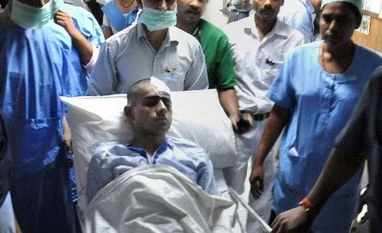In a fresh twist in the Dadri lynching case, the meat sample said to be beef by a report prepared by a forensic lab in Mathura might not have come from the vicitm Mohammad Akhlaq's house, reported the Economic Times on Thursday.
The latest report's findings contradict the preliminary report by the Uttar Pradesh Veterinary department, which had said that the meat over which Akhlaq, 52, was lynched on September 28, 2015, was mutton.
Akhlaq was beaten to death by a mob in Dadri, Uttar Pradesh, 56 kilometres away from the national capital, over alleged rumours that his family had eaten beef.
Adding to the controversy surrounding the incident, Uttar Pradesh Chief Minister Akhilesh Yadav has questioned the authenticity of the latest forensic report.
Five questions the new report throws up:
1) Where was the meat found?
More From This Section
According to the Economic Times, a copy of the seizure memo prepared by the UP Police on the day of the incident shows that the sample sent for tests was taken from meat found by sub-inspector Tej Pal Singh from a "tri-junction near a transformer" in the village. According to the financial daily, the memo says that the sample was collected in presence of independent witnesses on the night of September 28, 2015. However, citing the memo, the report says that the meat was not seized from Akhlaq's refrigerator or his residence.
UP Chief Minister Akhilesh Yadav has made the issue murkier after he questioned the authenticity of the latest forensic report which stated that the meat found was of "cow or its progeny".
Yadav raised doubts about the forensic procedure and the origins of the samples being referred to in the new report.
"Where was the sample sent, who received it? There was nothing objectionable in his house. Every eye is on this matter. Everyone wants that the victim's family should get justice as murder had taken place. After this incident, there was debate in the world regarding what to eat and speak. I think one should not get involved in such matters," Yadav said.
2) Cow or goat?
Immediately after the brutal incident, Akhlaq's daughter Sajida had said that they only had mutton (goat meat) in their fridge.
Speaking to an English daily, Sajida had said, “Every time there was a feast in this house, Hindu residents of the village would attend such functions. Even on Bakr-Id, we had guests. But suddenly they started doubting us. There was some mutton in the fridge which was taken away yesterday. They thought it was beef. The police have taken it for examination. If the results prove that it was not beef, will they bring back my dead father?”
In December last year, the report submitted by the chief veterinary officer of Uttar Pradesh had said that the meat found in Akhlaq's house was mutton and not beef.
The report said, "Prima facie it seems that meat found in Dadri lynching victim's house belongs to goat progeny."
However, the preliminary report had also said that the samples had been taken for final diagnosis, and had been sent to the forensic laboratory in Mathura.
3) Are Bharatiya Janata Party (BJP) MP Yogi Adityanath's demands legitimate?
In light of the new report, Adityanath has demanded that a case of cow slaughter should be registered against Akhlaq's family and that those arrested in relation to the lynching be released.
"They are mum on this report. The innocent Hindus arrested in the matter should me immediately released and a case of cow slaughter should be registered against Akhlaq's family," he said in Gorakhpur.
The police seems to disagree. According to reports, concerned police officials had said that the meat was sent for testing only to establish the motive for Akhlaq's killing.
The legally-unsound move of using this report to justify murder aside, according to the cow slaughter laws operational in the state, possession of beef is not a punishable offence and the recent report does not establish who slaughtered the animal from which the meat was obtained.
4) What happened to the Akhil Bharatiya Vidyarthi Parishad's (ABVP's) claims?
According to reports, ABVP was set to come up with the claim at its annual state-level convention to be held in Sitapur, from November 1 to 3 last year, that the lynching was the result of a personal dispute, with one of Mohammad Akhlaq's two sons having a 'love affair with a Hindu girl', and that politicians had wrongly projected it as a fallout of 'beef consumption'.
Nothing seems to have emerged from these claims and the ABVP has been mum on this angle.
5) Do the upcoming Assembly elections have anything to do with the report or the subsequent reactions to it?
The Uttar Pradesh Assembly polls, scheduled to be held in 2017, will be hotly contested; with the BJP looking to put up a good showing in the country's most populous state ahead of the 2019 General Elections.
Given the allegations made against the party, of employing communal politics to attract votes, people might wonder if Dadri, and the recent report, will become political tools for the party.
It would not be the first time that the party ratchets up the issue of beef consumption as an electoral strategy.
A day before Bihar voted in the fifth and final phase of the Assembly elections held last year, the BJP gave a prominent advertisement in newspapers featuring a woman hugging a cow, attacking Bihar Chief Minister Nitish Kumar on his silence over statements made by his allies on beef.
"Stop vote bank politics and explain whether you endorse these statements," the ad had said, before listing three comments made by Rashtriya Janata Dal chief Lalu Prasad Yadav and others. In each of the statements, the word beef had been highlighted in red.
)